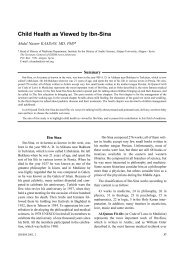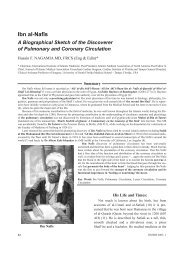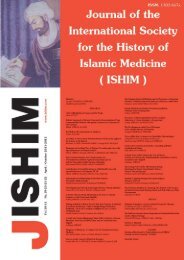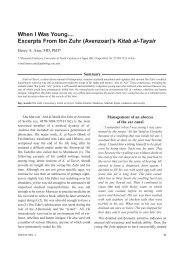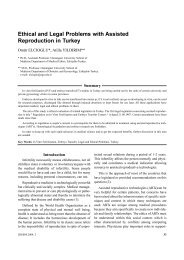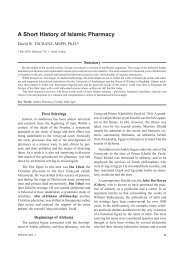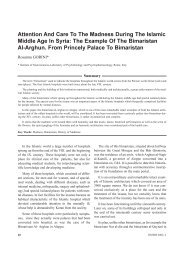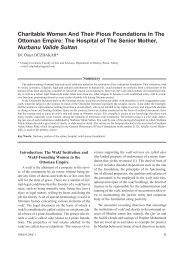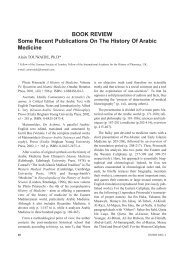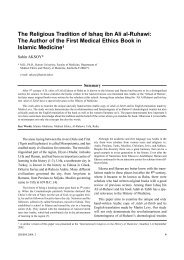The Valuable Contributions of Al-Razi (Rhazes) in the<strong>History</strong> of Pharmacy During the Middle AgesSharif Kaf AL-GHAZAL, MD, MS, RCS (Plast. Cert), DM (Plast)** 1 Merlin Close, Morley, Leeds LS27 8TS, Engl<strong>and</strong>e-mail:skalghazal@hotmail.comAl Razi was a Hakim, an alchemist <strong>and</strong> a philosopher. In medicine, his contribution was so significant that it can only be comparedto that of Ibn Sina. Some of his works in medicine e.g. Kitab al- Mansoori, Al-Hawi, Kitab al-Mulooki <strong>and</strong> Kitab al-Judari waal-Hasabah earned everlasting fame. Al-Razi was the first in Islam to write a book based on home medical (remedial) advisor entitledMan la Yahduruhu Teb for the general public.In his book Mnafi’ al-Aghthiyyah, al-Razi followed a pattern that had been introduced earlier by Galen but in it, al-Razi attemptedto correct several errors made by Galen himself.The development of professional pharmacy, as a separate entity from medicine, started in Islam under the patronage of the early’Abbasiyyah caliphs in Baghdad. This first clear-cut separation of the two professions, <strong>and</strong> the recognition of the independent, academicallyoriented status of professional pharmacy materialized in the Abbasiyyah capital (Baghdad) <strong>and</strong> Al Razi was one of the fewpharmacists who added very valuable contributions to medicine <strong>and</strong> pharmacy while most of Europe was still living in the dark ages.Key Words; Rhazes, <strong>History</strong> of Pharmacy, Middle Ages.SummaryArabic pharmacy (Saydalah) as a profession witha separate entity from medicine was recognized bythe ninth century. This century not only saw thefounding <strong>and</strong> an increase in the number of privatelyowned pharmacy shops in Baghdad <strong>and</strong> its vicinity,but in other Muslim cities as well. Many of the pharmacistswho managed them were skilled in theapothecary’s art <strong>and</strong> quite knowledgeable in the compounding,storing, <strong>and</strong> preserving of drugs. Statesponsoredhospitals also had their own dispensariesattached to manufacturing laboratories where syrups,electuaries, ointments, <strong>and</strong> other pharmaceuticalpreparations were prepared on a relatively largescale. The pharmacists <strong>and</strong> their shops were periodicallyinspected by a government appointed official(al-Muhtasib), <strong>and</strong> his aides. These officials were tocheck for accuracy the weights <strong>and</strong> measures as wellas the purity of the drugs used. Such supervision wasintended to prevent the use of deteriorating compoundeddrugs <strong>and</strong> syrups, <strong>and</strong> to safeguard the public.This early rise <strong>and</strong> development of professionalpharmacy in Islam (over four centuries before suchdevelopment took place in Europe) was the result ofthree major occurrences: 1- the great increase in theJISHIM 2003, 2dem<strong>and</strong> for drugs <strong>and</strong> their availability on the market;2- professional maturity; <strong>and</strong> 3- the outgrowth ofintellectual responsibility by qualified pharmacists.In this study, only certain important aspects of theinfluence of Al-Razi on the development of pharmacy<strong>and</strong> medical therapy in the ninth century will bebriefly discussed.Abu Bakr Mohammad Ibn Zakariya al-Razi (864-930 C.E.) was born at Ray, Iran. Initially, he wasinterested in music but later on he learnt medicine,mathematics, astronomy, chemistry, pharmacy <strong>and</strong>philosophy. At an early age he gained eminence as anexpert in medicine <strong>and</strong> alchemy, so that patients <strong>and</strong>students flocked to him from distant parts of Asia. Hewas first placed in-charge of the first Royal Hospitalat Ray, from where he soon moved to a similar positionin Baghdad where he remained the head of itsfamous Muqtadari Hospital for along time. Hemoved from time to time to various cities, speciallybetween Ray <strong>and</strong> Baghdad, but finally returned toRay, where he died around 930 C.E. His name iscommemorated in the Razi Institute near Tehran.9
Sharif Kaf AL-GHAZALAl Razi was a Hakim, an alchemist <strong>and</strong> a philosopher.In medicine, his contribution was so significantthat it can only be compared to that of Ibn Sina. Someof his works in medicine e.g. Kitab al- Mansoori, Al-Hawi, Kitab al-Mulooki <strong>and</strong> Kitab al-Judari wa al-Hasabah earned everlasting fame. Kitab al-Mansoori,which was translated into Latin in the 15 th century,comprised ten volumes <strong>and</strong> dealt exhaustively withGreco-Arab medicine. Some of its volumes were publishedseparately in Europe. His book al-Judari walHasabah was the first treatise on smallpox <strong>and</strong> chicken-pox,<strong>and</strong> is largely based on al-Razi’s original contribution:It was translated into various European languages.Through this treatise he became the first todraw clear comparisons between smallpox <strong>and</strong> chicken-pox.His book Al-Hawi was the largest medicalencyclopaedia composed by then. It contained on eachmedical subject all important information that wasavailable from Greek <strong>and</strong> Arab sources, <strong>and</strong> this wasconcluded by him by giving his own remarks based onhis experience <strong>and</strong> views. A special feature of his medicalsystem was that he greatly favoured cure throughcorrect <strong>and</strong> regulated food. This was combined withhis emphasis on the influence of psychological factorson health. He also tried proposed remedies first on animalsin order to evaluate in their effects <strong>and</strong> sideeffects. He was also an expert surgeon <strong>and</strong> was the firstto use opium for anaesthesia.The best survey of al-Razi’s works from themedieval period seems to be an epistle by al-Biruniwritten about 1037. Through this epistle, can be seenconcealed sides of al-Razi’s life <strong>and</strong> his contributionsas a prolific author <strong>and</strong> compiler to pharmacy <strong>and</strong>medical therapy. To underst<strong>and</strong> <strong>and</strong> appreciate himfully, however, one should look upon him as theproduct <strong>and</strong> in the context of his time. For in the West<strong>and</strong> Byzantium this was “an age of faith”, importantto our discussion here, therefore, is his courageousattack of errors in the medical <strong>and</strong> philosophicalteachings of the ancients. It was al-Razi who wrote abook, Shukuk ‘ala Nazariyyat jalinus, in which hedoubted the accuracy in many medical, physiological<strong>and</strong> therapeutic concepts, theories, <strong>and</strong> procedures asstated by Galen <strong>and</strong> which were blindly accepted <strong>and</strong>transmitted by his followers <strong>and</strong> later compilers <strong>and</strong>commentators.THE VALUABLE CONTRIBUTIONS OF AL-RAZI (RHAZES) IN THE HISTORYOF PHARMACY DURING THE MIDDLE AGESOn the professional level, al-Razi introducedmany useful, progressive, medical <strong>and</strong> psychologicalideas. He also attacked charlatans <strong>and</strong> fake doctorswho roamed the cities <strong>and</strong> the countryside sellingtheir nostrums <strong>and</strong> ‘cures’. At the same time, hewarned that even highly educated doctors did nothave the answers for all medical problems <strong>and</strong> couldnot cure all sicknesses or heal every disease. Al-Raziexhorted practitioners to keep up with advancedknowledge by continually studying medical books<strong>and</strong> expose themselves to new information. He furtherclassified diseases into three categories: thosewhich are curable; those that can be cured; <strong>and</strong> thosewhich are incurable. On the latter, he cited advancedcases of cancer <strong>and</strong> leprosy which if not cured, thedoctor should not take blame.Al-Razi was the first in Islam to write a book basedon home medical (remedial) advisor entitled Man laYahduruhu Teb for the general public. He dedicated itto the poor, the travellers, <strong>and</strong> the ordinary citizens whocould consult it for treatment of common ailmentswhen the doctor was not available. This book, ofcourse, is of special interest to the history of pharmacysince books on the same theme continued to appear <strong>and</strong>has found acceptance by readers to the present century.In its 36 chapters, al-Razi described diets <strong>and</strong> drugsthat can be found practically every where in apothecaryshops, the market place, in well-equipped kitchens, <strong>and</strong>in military camps. Thus, any intelligent mature personcan follow its instructions <strong>and</strong> prepare the right recipesfor good results. Some of the illnesses treated areheadaches, colds, coughing, melancholy, <strong>and</strong> diseasesof the eye, ear, <strong>and</strong> stomach. In a feverish headache, forexample, he prescribed, ‘two parts of the duhn (oilyextract) of rose, to be mixed with part of vinegar, inwhich a piece of linen cloth is dipped <strong>and</strong> compressedon the forehead’. For a laxative, he recommended‘seven drams of dried violet flowers with twenty pears,macerated <strong>and</strong> mixed well, then strained. To the filtrate,twenty drams of sugar is added for a draft’. Incases of melancholy, he invariably recommended prescriptionsincluding either poppies or their juices(opium) or clover dodder (Curcuma epithymum Muss.)or both. For an eye remedy, he recommended myrrh,saffron, <strong>and</strong> frankincense, two drams each to be mixedwith one dram of yellow arsenic <strong>and</strong> made into tablets.When used each tablet was to be dissolved in a suffi-10 JISHIM 2003, 2



